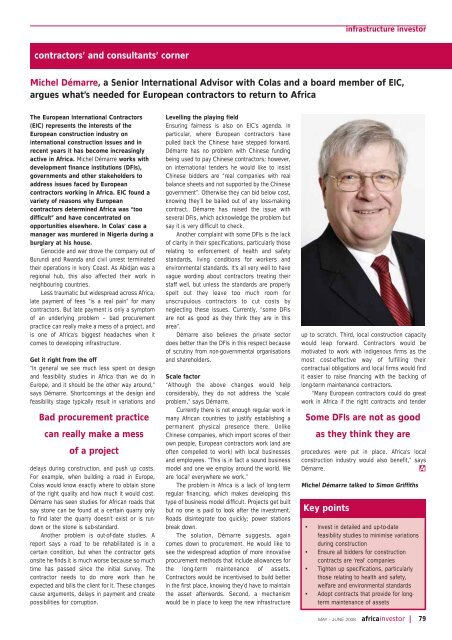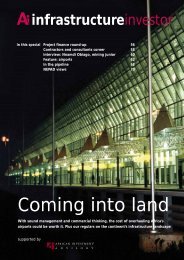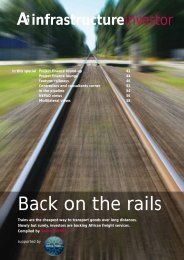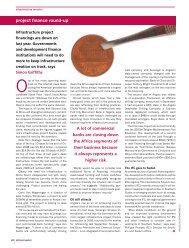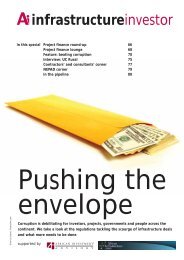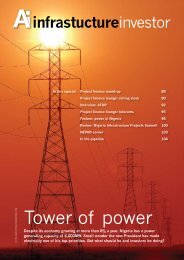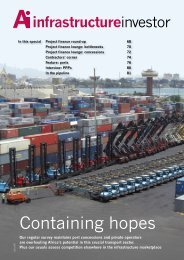Infrastructure investor May 2008 - Simon Griffiths
Infrastructure investor May 2008 - Simon Griffiths
Infrastructure investor May 2008 - Simon Griffiths
You also want an ePaper? Increase the reach of your titles
YUMPU automatically turns print PDFs into web optimized ePapers that Google loves.
infrastructure <strong>investor</strong>contractors’ and consultants’ cornerMichel Démarre, a Senior International Advisor with Colas and a board member of EIC,argues what’s needed for European contractors to return to AfricaThe European International Contractors(EIC) represents the interests of theEuropean construction industry oninternational construction issues and inrecent years it has become increasinglyactive in Africa. Michel Démarre works withdevelopment finance institutions (DFIs),governments and other stakeholders toaddress issues faced by Europeancontractors working in Africa. EIC found avariety of reasons why Europeancontractors determined Africa was “toodifficult” and have concentrated onopportunities elsewhere. In Colas’ case amanager was murdered in Nigeria during aburglary at his house.Genocide and war drove the company out ofBurundi and Rwanda and civil unrest terminatedtheir operations in Ivory Coast. As Abidjan was aregional hub, this also affected their work inneighbouring countries.Less traumatic but widespread across Africa,late payment of fees “is a real pain” for manycontractors. But late payment is only a symptomof an underlying problem – bad procurementpractice can really make a mess of a project, andis one of Africa’s biggest headaches when itcomes to developing infrastructure.Get it right from the off“In general we see much less spent on designand feasibility studies in Africa than we do inEurope, and it should be the other way around,”says Démarre. Shortcomings at the design andfeasibility stage typically result in variations andBad procurement practicecan really make a messof a projectdelays during construction, and push up costs.For example, when building a road in Europe,Colas would know exactly where to obtain stoneof the right quality and how much it would cost.Démarre has seen studies for African roads thatsay stone can be found at a certain quarry onlyto find later the quarry doesn’t exist or is rundownor the stone is sub-standard.Another problem is out-of-date studies. Areport says a road to be rehabilitated is in acertain condition, but when the contractor getsonsite he finds it is much worse because so muchtime has passed since the initial survey. Thecontractor needs to do more work than heexpected and bills the client for it. These changescause arguments, delays in payment and createpossibilities for corruption.Levelling the playing fieldEnsuring fairness is also on EIC’s agenda. Inparticular, where European contractors havepulled back the Chinese have stepped forward.Démarre has no problem with Chinese fundingbeing used to pay Chinese contractors; however,on international tenders he would like to insistChinese bidders are “real companies with realbalance sheets and not supported by the Chinesegovernment”. Otherwise they can bid below cost,knowing they’ll be bailed out of any loss-makingcontract. Démarre has raised the issue withseveral DFIs, which acknowledge the problem butsay it is very difficult to check.Another complaint with some DFIs is the lackof clarity in their specifications, particularly thoserelating to enforcement of health and safetystandards, living conditions for workers andenvironmental standards. It’s all very well to havevague wording about contractors treating theirstaff well, but unless the standards are properlyspelt out they leave too much room forunscrupulous contractors to cut costs byneglecting these issues. Currently, “some DFIsare not as good as they think they are in thisarea”.Démarre also believes the private sectordoes better than the DFIs in this respect becauseof scrutiny from non-governmental organisationsand shareholders.Scale factor“Although the above changes would helpconsiderably, they do not address the ‘scale’problem,” says Démarre.Currently there is not enough regular work inmany African countries to justify establishing apermanent physical presence there. UnlikeChinese companies, which import scores of theirown people, European contractors work (and areoften compelled to work) with local businessesand employees. “This is in fact a sound businessmodel and one we employ around the world. Weare ‘local’ everywhere we work.”The problem in Africa is a lack of long-termregular financing, which makes developing thistype of business model difficult. Projects get builtbut no one is paid to look after the investment.Roads disintegrate too quickly; power stationsbreak down.The solution, Démarre suggests, againcomes down to procurement. He would like tosee the widespread adoption of more innovativeprocurement methods that include allowances forthe long-term maintenance of assets.Contractors would be incentivised to build betterin the first place, knowing they’d have to maintainthe asset afterwards. Second, a mechanismwould be in place to keep the new infrastructureup to scratch. Third, local construction capacitywould leap forward. Contractors would bemotivated to work with indigenous firms as themost cost-effective way of fulfilling theircontractual obligations and local firms would findit easier to raise financing with the backing oflong-term maintenance contractors.“Many European contractors could do greatwork in Africa if the right contracts and tenderSome DFIs are not as goodas they think they areprocedures were put in place. Africa’s localconstruction industry would also benefit,” saysDémarre.Michel Démarre talked to <strong>Simon</strong> <strong>Griffiths</strong>Key points• Invest in detailed and up-to-datefeasibility studies to minimise variationsduring construction• Ensure all bidders for constructioncontracts are ‘real’ companies• Tighten up specifications, particularlythose relating to health and safety,welfare and environmental standards• Adopt contracts that provide for longtermmaintenance of assetsMAY - JUNE <strong>2008</strong> africa<strong>investor</strong> |79


